The brave new world美丽新世界PPT电子教案
BRAVE NEW WORLD 美丽新世界 ppt课件

(野蛮人拘留区).
Occasionally John get into the greatest power area, Central London. John first had the future to look at the night's "Brave New World", where the technology was exciting.
Brief Introduction
•
Protagonist “barbarians” John is a
failure of individual embryos incubated, he
and his mother, Linda, live in New
Mexico which has the “savage reservation”
1,Artificial incubation(人工孵化) ---the birth of mankind depend on the machinery in a neat and clean, no father and mother environment. No one will interfere with your career and marriage, but you have no home and family.
美丽新世界Brave New World
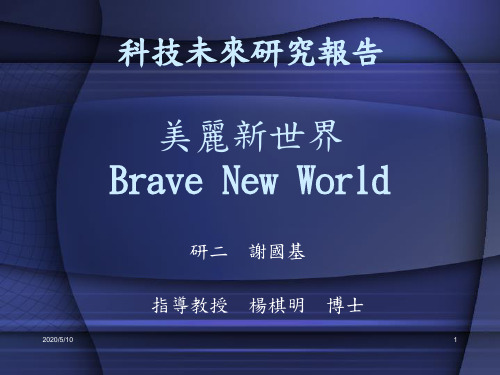
《美麗新世界》作者介紹
•1932年《美麗新世界》出版 •1934年,全家定居在南加州洛杉磯 有一段時間在好萊塢工作 •之後,赫胥黎繼續在好萊塢工作, 寫了很多部小說、短篇故事、 散論與研究、詩、戲劇等等。 •1963年,歿於美國好萊塢。
2018/9/22 4
《美麗新世界》前言
•學生了解低等階級為什麼不能浪費社會 的時間去讀書,而且讀書又有反制約的危 險,那為何要讓德爾塔階級不能接受花朵? •主任解釋:原本讓他們見到玫瑰而驚叫, 是為了高度的經濟政策。他們喜歡花朵, 一有機會就到鄉村,目的是強迫他們消耗 運輸業。可是有一個嚴重的缺點。愛好自 然使工廠不忙碌,但是不去除他們對消耗 運輸業的傾向。
2018/9/22
20
第2章 制約與催眠教育
•第三次問男孩:「哪條河流最長, 湯米?」男孩哭出來,說我不知道。 •這樣的哭叫聲讓早期研究者心灰意 冷。
2018/9/22
21
第2章 制約與催眠教育
•初步階級意識教育:在八十個嬰兒 枕頭下,有一個聲音:「德爾塔兒 童穿卡其。噢,我不要跟德爾塔孩 子玩。愛普西隆更壞。他們笨得連 讀書寫字都不會。還有,他們穿黑 的,最可惡的顏色。我那麼高興我 是貝塔。
•在這本書中有幾個缺點需要提及: 1.野蠻人只獲得在兩種生存狀態之間 做選擇的權利。 2.讓他熟讀莎士比亞,為了戲劇效果 3.野蠻人生命結束於狂烈的自我折磨 與絕望的自殺,符合作者當時對人 生的懷疑態度。
2018/9/22 5
《美麗新世界》前言
•4.討論未來的小說,不論在藝術上 或哲學上是否有完整性,它的預 言必須看起來有可能性。 •5.本書未提到核子分裂,這個時代 原子能是常見的話題。 6.本書主題不是科學進步的本身, 而是科學進步對人的影響。
CloningBraveNewWord课堂PPT
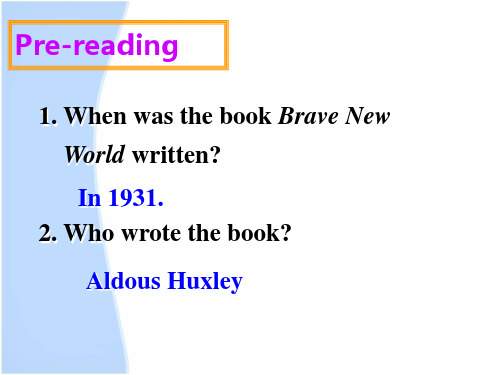
Read para3 and analyze the sentence.
The government also keeps people
主语
谓语 宾语
happy with the use of a drug called soma
3.Why is it so famous? Because it describes a terrifying future world that is becoming more and more possible.
Read para2 and answer the questions
1.When does the new world take place ? 2.How many types of clones are there? 3.Who is the leader? 4. Why scientists haven’t created
3. Each Alpha person is identical but each Beta person is not. F
4. In the world described in the novel, every single person is happy with its position in society. F
宾语补足语
状语
定语
that makes people happy
定语从句
stop…(from) doing 阻止某人干某事
同义短语: prevent…from doing; keep …from doing
The brave new world美丽新世界 ppt
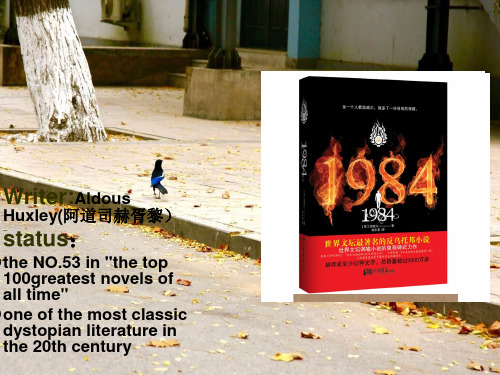
BRAVE NEW WORLD
• Aldous Huxley(阿道 司赫胥黎) • time:1894—1963
1:About the writer
• He was a grandson of
the famous biologist Thomas Henry Huxley(1825-1895)
BRAVE NEW WORLD 2:What‘s the Dystopia • A:First,what is the Utopia?
Writer:Aldous status:
Huxley(阿道司赫胥黎)
① the NO.53 in "the top 100greatest novels of all time" ② one of the most classic dystopian literature in the 20th century
• B:cacotopia, kakotopia(坎坷邦)
BRAVE NEW WORLD ---------------------------------
Dystopia
• A dystopia is a community or society that is in some important way undesirable or frightening. It is literally translated as ―notgood place‖( an antonym of utopia. ) • Such societies appear in many artistic works, particularly in stories set in a future. Dystopias are often characterized by dehumanization, totalitarian governments, environmental disaster , or other characteristics associated with a cataclysmic decline in society. Dystopian societies appear in many sub-genres of fiction and are often used to draw attention to real-world issues regarding society, environment, politics, economics, religion, psychology, ethics, science, and or technology, which if unaddressed could potentially lead to such a dystopia-like condition.
读《美丽新世界》——浅谈乌托邦与反乌托邦
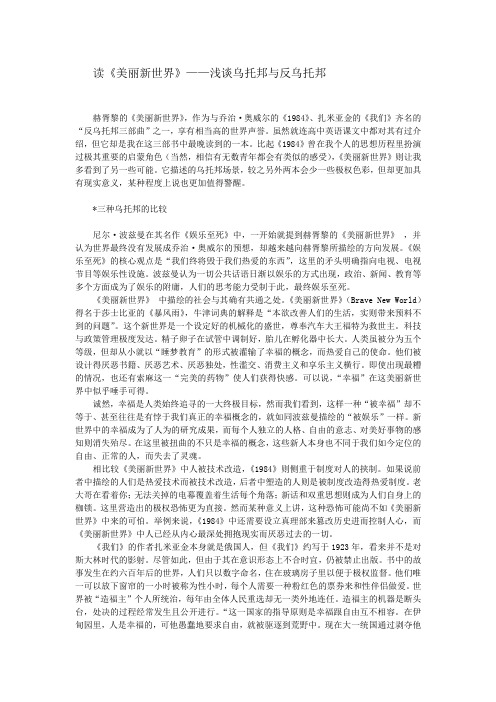
读《美丽新世界》——浅谈乌托邦与反乌托邦赫胥黎的《美丽新世界》,作为与乔治·奥威尔的《1984》、扎米亚金的《我们》齐名的“反乌托邦三部曲”之一,享有相当高的世界声誉。
虽然就连高中英语课文中都对其有过介绍,但它却是我在这三部书中最晚读到的一本。
比起《1984》曾在我个人的思想历程里扮演过极其重要的启蒙角色(当然,相信有无数青年都会有类似的感受),《美丽新世界》则让我多看到了另一些可能。
它描述的乌托邦场景,较之另外两本会少一些极权色彩,但却更加具有现实意义,某种程度上说也更加值得警醒。
*三种乌托邦的比较尼尔·波兹曼在其名作《娱乐至死》中,一开始就提到赫胥黎的《美丽新世界》,并认为世界最终没有发展成乔治·奥威尔的预想,却越来越向赫胥黎所描绘的方向发展。
《娱乐至死》的核心观点是“我们终将毁于我们热爱的东西”,这里的矛头明确指向电视、电视节目等娱乐性设施。
波兹曼认为一切公共话语日渐以娱乐的方式出现,政治、新闻、教育等多个方面成为了娱乐的附庸,人们的思考能力受制于此,最终娱乐至死。
《美丽新世界》中描绘的社会与其确有共通之处。
《美丽新世界》(Brave New World)得名于莎士比亚的《暴风雨》,牛津词典的解释是“本欲改善人们的生活,实则带来预料不到的问题”。
这个新世界是一个设定好的机械化的盛世,尊奉汽车大王福特为救世主。
科技与政策管理极度发达。
精子卵子在试管中调制好,胎儿在孵化器中长大。
人类虽被分为五个等级,但却从小就以“睡梦教育”的形式被灌输了幸福的概念,而热爱自己的使命。
他们被设计得厌恶书籍、厌恶艺术、厌恶独处,性滥交、消费主义和享乐主义横行。
即使出现最糟的情况,也还有索麻这一“完美的药物”使人们获得快感。
可以说,“幸福”在这美丽新世界中似乎唾手可得。
诚然,幸福是人类始终追寻的一大终极目标,然而我们看到,这样一种“被幸福”却不等于、甚至往往是有悖于我们真正的幸福概念的,就如同波兹曼描绘的“被娱乐”一样。
BRAVENEWWORLD内容简介(AldousHuxley)

BRAVE NEW WORLD 美丽新世界Aldous HuxleyPlot Overview 情节一览The novel opens in the Central London Hatching and Conditioning Centre, where the Director of the Hatchery and one of his assistants, Henry Foster, are giving a tour to a group of boys. The boys learn about the Bokanovsky and Podsnap Processes that allow the Hatchery to produce thousands of nearly identical human embryos. During the gestation period the embryos travel in bottles along a conveyor belt through a factorylike building, and are conditioned to belong to one of five castes: Alpha, Beta, Gamma, Delta, or Epsilon. The Alpha embryos are destined to become the leaders and thinkers of the World State. Each of the succeeding castes is conditioned to be slightly less physically and intellectually impressive. The Epsilons, stunted and stupefied by oxygen deprivation and chemical treatments, are destined to perform menial labor. Lenina Crowne, an employee at the factory, describes to the boys how she vaccinates embryos destined for tropical climates.The Director then leads the boys to the Nursery, where they observe a group of Delta infants being reprogrammed to dislike books and flowers. The Director explains that this conditioning helps to make Deltas docile and eager consumers. He then tells the b oys about the “hypnopaedic” (sleep-teaching) methods used to teach children the morals of the World State. In a room where older children are napping, a whispering voice is heard repeating a lesson in “Elementary Class Consciousness.”Outside, the Director shows the boys hundreds of naked children engaged in sexual play and games like “Centrifugal Bumble-puppy.” Mustapha Mond, one of the ten World Controllers, introduces himself to the boys and begins to explain the history of the World State, focusing on the State’s successful efforts to remove strong emotions, desires, and human relationships from society. Meanwhile, inside the Hatchery, Lenina chats in the bathroom with Fanny Crowne about her relationship with Henry Foster. Fanny chides Lenina for going out with Henry almost exclusively for four months, and Lenina admits she is attracted to the strange, somewhat funny-looking Bernard Marx. In another part of the Hatchery, Bernard is enraged when he overhears a conversation between Henry and the Assistant Predestinator about “having” Lenina.After work, Lenina tells Bernard that she would be happy to accompany himon the trip to the Savage Reservation in New Mexico to which he had invited her. Bernard, overjoyed but embarrassed, flies a helicopter to meet a friend of his, Helmholtz Watson. He and Helmholtz discuss their dissatisfaction with the World State. Bernard is primarily disgruntled because he is too small and weak for his caste; Helmholtz is unhappy because he is too intelligent for his job writing hypnopaedic phrases. In the next few days, Bernard asks his superior, the Director, for permission to visit the Reservation. The Director launches into a story about a visit to the Reservation he had made with a woman twenty years earlier. During a storm, he tells Bernard, the woman was lost and never recovered. Finally, he gives Bernard the permit, and Bernard and Lenina depart for the Reservation, where they get another permit from the Warden. Before heading into the Reservation, Bernard calls Helmholtz a nd learns that the Director has grown weary of what he sees as Bernard’s difficult and unsocial behavior and is planning to exile Bernard to Iceland when he returns. Bernard is angry and distraught, but decides to head into the Reservation anyway.On the Reservation, Lenina and Bernard are shocked to see its aged and ill residents; no one in the World State has visible signs of aging. They witness a religious ritual in which a young man is whipped, and find it abhorrent. After the ritual they meet John, a fair-skinned young man who is isolated from the rest of the village. John tells Bernard about his childhood as the son of a woman named Linda who was rescued by the villagers some twenty years ago. Bernard realizes that Linda is almost certainly the woman mentioned by the Director. Talking to John, he learns that Linda was ostracized because of her willingness to sleep with all the men in the village, and that as a result John was raised in isolation from the rest of the village. John explains that he learned to read using a book called The Chemical and Bacteriological Conditioning of the Embryo and The Complete Works of Shakespeare, the latter given to Linda by one of her lovers, Popé. John tells Bernard that he is eager to see the “Other Place”—the “brave new world” that his mother has told him so much about. Bernard invites him to return to the World State with him. John agrees but insists that Linda be allowed to come as well.While Lenina, disgusted with the Reservation, takes enough soma to knock her out for eighteen hours, Bernard flies to Santa Fe where he calls Mustapha Mond and receives permission to bring John and Linda back to the World State. Meanwhile, John breaks into the house where Lenina is lying intoxicated and unconscious, and barely suppresses his desire to touch her. Bernard, Lenina, John, and Linda fly to the World State, where the Director is waiting to exile Bernard in front of his Alpha coworkers. But Bernard turns the tables by introducing John and Linda. The shame of being a “father”—the very word makes the onlookers laugh nervously—causes the Director to resign, leaving Bernard free to remain in London.John becomes a hit with London society because of his strange life led on the Reservation. But while touring the factories and schools of the World State, John becomes increasingly disturbed by the society that he sees. His sexual attraction to Lenina remains, but he desires more than simple lust, and he finds himself terribly confused. In the process, he also confuses Lenina, who wonders why John does not wish to have sex with her. As the discoverer and guardian of the “Savage,” Bernard also becomes popular. He quickly takes advantage of his new status, sleeping with many women and hosting dinner parties with important guests, most of whom dislike Bernard but are willing to placate him if it means they get to meet John. One night John refuses to meet the guests, including the Arch-Community Songster, and Bernard’s social standing plummets.After Bernard introduces them, John and Helmholtz quickly take to each other. John reads Helmholtz parts of Romeo and Juliet, but Helmholtz cannot keep himself from laughing at a serious passage about love, marriage, and parents—ideas that are ridiculous, almost scatological in World State culture. Fueled by his strange behavior, Lenina becomes obsessed with John, refusing Henry’s invitation to see a feely. She takes soma and visits John at Bernard’s apartment, where she hopes to seduce him. But John responds to her advances with curses, blows, and lines from Shakespeare. She retreats to the bathroom while he fields a phone call in which he learns that Linda, who has been on permanent soma-holiday since her return, is about to die. At the Hospital for the Dying he watches her die while a group of lower-caste boys receiving their “death conditioning” wonder why she is so unattractive. The boys are simply curious, but John becomes enraged. After Linda dies, John meets a group of Delta clones who are receiving their soma ration. He tries to convince them to revolt, throwing the soma out the window, and a riot results. Bernard and Helmholtz, hearing of the riot, rush to the scene and come to John’s aid. After the riot is calmed by police with soma vapor, John, Helmholtz, and Bernard are arrested and brought to the office of Mustapha Mond.John and Mond debate the value of the World State’s policies, John arguing that they dehumanize the residents of the World State and Mond arguing that stability and happiness are more important than humanity. Mond explains that social stability has required the sacrifice of art, science, and religion. John protests that, without these things, human life is not worth living. Bernard reacts wildly when Mond says that he and Helmholtz will be exiled to distant islands, and he is carried from the room. Helmholtz accepts the exile readily, thinking it will give him a chance to write, and soon follows Bernard out of theroom. John and Mond continue their conversation. They discuss religion and the use of soma to control negative emotions and social harmony.John bids Helmholtz and Bernard good-bye. Refused the option of following them to the islands by Mond, he retreats to a lighthouse in the countryside where he gardens and attempts to purify himself by self-flagellation. Curious World State citizens soon catch him in the act, and reporters descend on the lighthouse to film news reports and a feely. After the feely, hordes of people descend on the lighthouse and demand that John whip himself. Lenina comes and approaches John with her arms open. John reacts by brandishing his whip and screaming “Kill it! Kill it!” The intensity of the scene causes an orgy in which John takes part. The next morning he wakes up and, overcome with anger and sadness at his submission to World State society, hangs himself. Context 背景Aldous Huxley was born in Surrey, England, on July 26, 1894, to an illustrious family deeply rooted in England’s literary and scientific tradition. Huxley’s father, Leonard Huxley, was the son of Thomas Henry Huxley, a well-known biologist who gained t he nickname “Darwin’s bulldog” for championing Charles Darwin’s evolutionary ideas. His mother, Julia Arnold, was related to the important nineteenth-century poet and essayist Matthew Arnold.Raised in this family of scientists, writers, and teachers (his father was a writer and teacher, and his mother a schoolmistress), Huxley received an excellent education, first at home, then at Eton, providing him with access to numerous fields of knowledge. Huxley was an avid student, and during his lifetime he was renowned as a generalist, an intellectual who had mastered the use of the English language but was also informed about cutting-edge developments in science and other fields. Although much of his scientific understanding was superficial—he was easily convinced of findings that remained somewhat on the fringe of mainstream science—his education at the intersection of science and literature allowed him to integrate current scientific findings into his novels and essays in a way that few other writers of his time were able to do. Aside from his education, another major influence on Huxley’s life and writing was an eye disease contracted in his teenage years that left him almost blind. As a teenager Huxley had dreamed about becoming a doctor, but the degeneration of his eyesight prevented him from pursuing his chosen career. It also severely restricted the activities he could pursue. Because of his near blindness, he depended heavily on his first wife, Maria, to take care of him. Blindness and vision are motifs that permeate much of Huxley’s writing.After graduating from Oxford in 1916, Huxley began to make a name for himself writing satirical pieces about the British upper class. Though these writings were skillful and gained Huxley an audience and literary name, they were generally considered to offer little depth beyond their lightweight criticisms of social manners. Huxley continued to write prolifically, working as an essayist and journalist, and publishing four volumes of poetry before beginning to work on novels. Without giving up his other writing, beginning in 1921, Huxley produced a series of novels at an astonishing rate: Crome Yellow was published in 1921, followed by Antic Hay in 1923, Those Barren Leaves in 1925, and Point Counter Point in 1928. During these years, Huxley left his early satires behind and became more interested in writing about subjects with deeper philosophical and ethical significance. Much of his work deals with the conflict between the interests of the individual and society, often focusing on the problem of self-realization within the context of social responsibility. These themes reached their zenith in Huxley’s Brave New World, published in 1932. His most enduring work imagined a fictional future in which free will and individuality have been sacrificed in deference to complete social stability.Brave New World marked a step in a new direction for Huxley, combining his skill for satire with his fascination with science to create a dystopian (anti-utopian) world in which a totalitarian government controlled society by the use of science and technology. Through its exploration of the pitfalls of linking science, technology, and politics, and its argument that such a link will likely reduce human individuality, Brave New World deals with similar themes as George Orwell’s famous novel 1984. Orwell wrote his novel in 1949, after the dangers of totalitarian governments had been played out to tragic effect in World War II, and during the great struggle of the Cold War and the arms race which so powerfully underlined the role of technology in the modern world. Huxley anticipated all of these developments. Hitler came to power in Germany a year after the publication of Brave New World. World War II broke out six years after. The atomic bomb was dropped thirteen years after its publication, initiating the Cold War and what President Eisenhower referred to as a frightening buildup of the “military-industrial complex.” Huxley’s novel seems, in many ways, to prophesize the major themes and struggles that dominated life and debate in the second half of the twentieth century, and continue to dominate it in the twenty-first.After publishing Brave New World, Huxley continued to live in England, making frequent journeys to Italy. In 1937 Huxley moved to California. An ardent pacifist, he had become alarmed at the growing military buildup in Europe, and determined to remove himself from the possibility of war. Already famous as a writer of novels and essays, he tried to make a living as ascreenwriter. He had little success. Huxley never seemed to grasp the requirements of the form, and his erudite literary style did not translate well to the screen.In the late forties, Huxley started to experiment with hallucinogenic drugs such as LSD and mescaline. He also maintained an interest in occult phenomena, such as hypnotism, séances, and other activities occupying the border between science and mysticism. Huxley’s experiments with drugs led him to write several books that had profound influences on the sixties counterculture. The book he wrote about his experiences with mescaline, The Doors of Perception, influenced a young man named Jim Morrison and his friends, and they named the band they formed The Doors. (The phrase, “the doors of perception” comes from a William Blake poem called The Marriage of Heaven and Hell.) In his last major work, Island, published in 1962, Huxley describes a doomed utopia called Pala that serves as a contrast to his earlier vision of dystopia. A central aspect of Pala’s ideal culture is the use of a hallucinogenic drug called “moksha,” which provides an interesting context in which to view soma, the drug in Brave New World that serves as one tool of the totalitarian state. Huxley died on November 22, 1963, in Los Angeles. Utopias and DystopiasBrave New World belongs to the genre of utopian literature. A utopia is an imaginary society organized to create ideal conditions for human beings, eliminating hatred, pain, neglect, and all of the other evils of the world.The word ut opia comes from Sir Thomas More’s novel Utopia (1516), and it is derived from Greek roots that could be translated to mean either “good place” or “no place.” Books that include descriptions of utopian societies were written long before More’s novel, however. Plato’s Republic is a prime example. Sometimes the societies described are meant to represent the perfect society, but sometimes utopias are created to satirize existing societies, or simply to speculate about what life might be like under different conditions. In the 1920s, just before Brave New World was written, a number of bitterly satirical novels were written to describe the horrors of a planned or totalitarian society. The societies they describe are called dystopias, places where things are badly awry. Either term, utopia or dystopia, could correctly be used to describe Brave New World.。
Brave New World 美丽新世界

Huxley said that Brave New World was inspired by the utopian novels of H. G. Wells, including A Modern Utopia (1905) and Men Like Gods (1923).Wells' hopeful vision of the future's possibilities gave Huxley the idea to begin writing a parody of the novel, which became Brave New World.
Helmholtz Watson –
handsome and successful Alpha-Plus lecturer at the
College of Emotional Engineering and a friend of
Bernard.
Mustapha Mond – Resident World Controller of
He remains committed to values that exist only in his poetry, first spurning Lenina for failing to live up to his Shakespearean ideal and then the entire utopian society. He then ostracizes himself from society and attempts to purify himself of "sin" (desire), but is finally unable to do so and hangs himself in despair.
The brave new world美丽新世界PPT精选文档

Characters
• Bernard Marx – an Alpha-Plus sleep-learning specialist at the Central London Hatcheries
[ˈhæ tʃəri]n.(尤指鱼的)
孵化场 and ConditioniAbout the main idea
• TIME:AD2540(632A.F .-After Ford)
• two places: reservation(保留地) World State(世界国)
6
I. Fetuses [ˈfitəs]n.(胎,胎儿)are chosen to become members of different castes [kæ st] (社会等级) -------(α)alpha,(β)beta, (γ)gamma, (δ)delta, (ε)epsilon.
10
Characters John is a savagery.
John – the illicit [ɪˈlɪsɪt](
非法的) son of the Director of the Incubation [ˌɪnkjəˈbeʃən,}Center and Linda, born and reared on the Savage [ˈsævɪdʒ] adj.未开化 的; 野蛮的Reservation (“Malpais”) after Linda was unwittingly { ˌʌnˈwɪtɪŋlɪ](不知情地) left behind by her errant[ˈerənt] (犯错误的 ; 行为不当的) lover.
; 操纵; 控制(心理操控), • classical conditioning(建立婴儿条件反射)
《美丽新世界》PPT课件
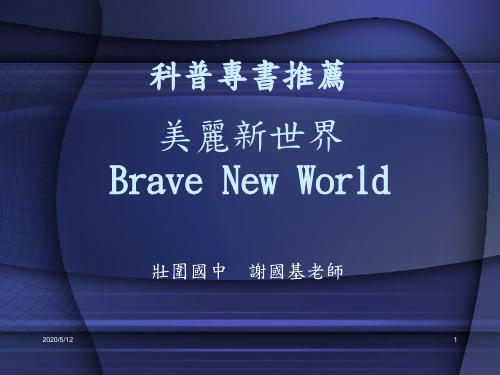
第6章 進入新墨西哥保留區
•主任在幫柏納德簽許可證的當下, 曾說過有一次去新墨西哥保留區,和 一個負貝塔女孩去,後來,女孩失蹤, 主任也受傷了,這事件讓主任長做夢。 •蘭妮娜跟柏納德進入野蠻人保留區, 所搭乘的飛機又回去,會再第二天來 接他們。
2018/11/21 37
第7章 美麗新世界外的世界
2018/11/21 28
第3章 性愛關係與家庭
•地點:花園。 •背景:六、七百個小孩,光著身子在陽 光下奔跑著、嬉戲著 •事件:一個七歲男孩和一個八歲的女孩 在從事初級的性遊戲。在福特之前的那 個很久的時代,兒童間之的性愛被認為 變態,而且到20歲才可以。參觀的學生 發出了不可置信的驚嘆。
2018/11/21 29
2018/11/21
20
第2章 制約與催眠教育
•第三次問男孩:「哪條河流最長, 湯米?」男孩哭出來,說我不知道。 •這樣的哭叫聲讓早期研究者心灰意 冷。
2018/11/21
21
第2章 制約與催眠教育
•初步階級意識教育:在八十個嬰兒 枕頭下,有一個聲音:「德爾塔兒 童穿卡其。噢,我不要跟德爾塔孩 子玩。愛普西隆更壞。他們笨得連 讀書寫字都不會。還有,他們穿黑 的,最可惡的顏色。我那麼高興我 是貝塔。
2018/11/21 15
第2章 制約與催眠教育
•「書、噪音、花朵、電擊」已在嬰 兒腦中結合在一起。孩子會帶著心 理學家所謂的對書與花朵『本能的』 厭惡長大。他們終生都可以免於書 本與植物,於是還在哭叫的嬰兒被 推出去,留下吐奶的味道,以及最 受歡迎的沉默。
2018/11/21 16
第2章 制約與催眠教育
•在這本書中有幾個缺點需要提及: 1.野蠻人只獲得在兩種生存狀態之間 做選擇的權利。 2.讓他熟讀莎士比亞,為了戲劇效果 3.野蠻人生命結束於狂烈的自我折磨 與絕望的自殺,符合作者當時對人 生的懷疑態度。
Unit1TheChangingWorldppt课件初中英语科普版九年级上册
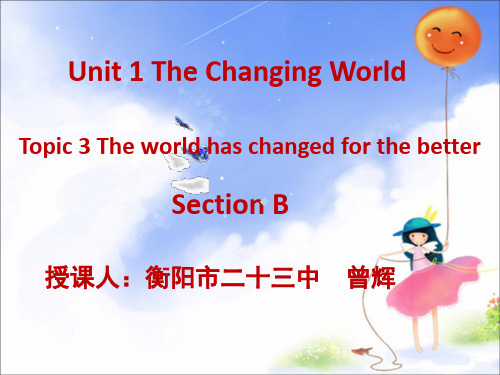
常见心律失常心电图诊断的误区诺如 病毒感 染的防 控知识 介绍责 任那些 事浅谈 用人单 位承担 的社会 保险法 律责任 和案例 分析现 代农业 示范工 程设施 红地球 葡萄栽 培培训 材料
Exercises
( ) 1. His father ______ the Party since 1978.
Rewrite Salama’s story(用现在完成时)
HHerefraftahtehrehr adsiebde3enyedaerasdafgoor.3 years. HeHremr motohtehrehralesfbt eheonmaewtwayofryoemarhsoamgoe.for two years. HHerersissitsetrerhgasotbmeeanrrmiedarirnie2d0s1i4n.ce 2014. HHererbbroroththererhjaosinbeedenthienathrme yarimn y20s1in3.ce 2013.
A. has begun
B. had begun
C. has been on
D. began
( ) 4. My parents _____ Shandong for ten years.
A. have been to
7.A.decided to
B.decided with
C.decided on
8.A.program
B.homeless
C.old
9.A.feel well
B.feel good
C.felt good
10.A.get used to
ed to
C.get used for
常见心律失常心电图诊断的误区诺如 病毒感 染的防 控知识 介绍责 任那些 事浅谈 用人单 位承担 的社会 保险法 律责任 和案例 分析现 代农业 示范工 程设施 红地球 葡萄栽 培培训 材料
九年级英语《Unit 1 The Changing World》课件

Topic 1 My hometown has become more and more beautiful.
Section B
(录音)
Maria has come back from Cuba.
What did she do in her hometown?
(录音)
cook for the travel disabled children
√
√
×
√
×
baned rooms for the disabled children? A: Has she
fed the disabled children? B: Yes, she has. No, she hasn’t.
She took part in some volunteer activities.
She helped the disabled children.
volunteer activities
disabled children
Listen and tick what Maria has done in her hometown. clean rooms for the be a disabled volunteer children Maria feed the disabled children
different ________
kinds of clothes good
more kinds, like singing drawing, _______, playing musical instruments and receivingsome ________ other training
BRAVE NEW WORLD 美丽新世界
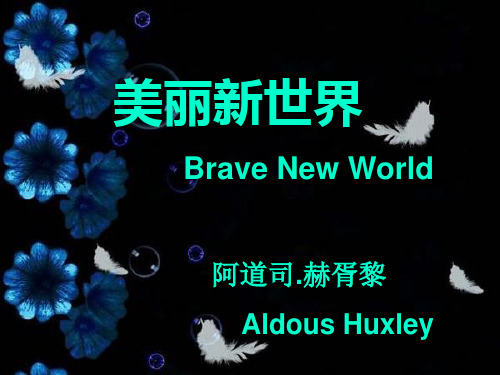
My opinions
• Development of society
• Happiness guided by …? • Human beings
All here !
Thank you !!!!!!!
美丽新世界
Brave New World
阿道司.赫胥黎
Aldous Huxley
Written in 1932, before the outbreak of the Second World War.
About the Author
• Aldous Huxley (1894-1962) 阿道司.赫胥黎
4,Sex and Love ---in this society, monogamy is not encouraged, in order to avoid feelings of depression caused by the strong work, the human beings are arranged from children to do all sorts of sexual games. As long as adults are interested in each other, they can have a relationship. No love, no marriage proposal before the hard pursuit, no payment for the other party.
4,Sex and Love
1,Artificial incubation(人工孵化) ---the birth of mankind depend on the machinery in a neat and clean, no father and mother environment. No one will interfere with your career and marriage, but you have no home and family.
高中英语必修二unit2原文

高中英语必修二unit2原文"Brave New World" is a novel by Aldous Huxley that explores a dystopian society where technology and government control dominate every aspect of human life. In this world, people are genetically engineered and conditioned to fit into specific social classes, with little to no room for individuality or free will. The government uses various methods, such as mind-altering drugs and psychological manipulation, to maintain control over its citizens. The novel raises important questions about the consequences of sacrificing personal freedoms for societal stability.《美丽新世界》是奥尔德斯·赫胥黎创作的一部小说,探讨了一个科技和政府控制主导一切人类生活方面的反乌托邦社会。
在这个世界里,人们被基因工程和社会阶级的条件所改造,几乎没有个性或自由意志的空间。
政府利用各种方法,如改变心灵的药物和心理操纵,来维持对公民的控制。
这部小说引发了关于为了社会稳定而牺牲个人自由所带来的后果的重要问题。
One of the central themes of "Brave New World" is the idea of happiness and the price that society is willing to pay for it. In the novel, the citizens of the World State are kept content through theuse of pleasure-inducing drugs and instant gratification, but at the cost of their individuality and humanity. This raises the question of whether true happiness can be achieved without the presence of personal freedom and self-expression.《美丽新世界》的一个核心主题是幸福的概念以及社会愿意为之付出的代价。
《美丽新世界》教案
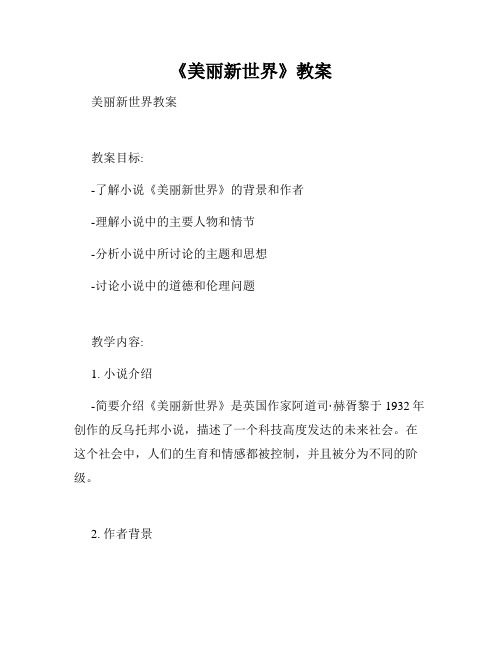
《美丽新世界》教案美丽新世界教案教案目标:-了解小说《美丽新世界》的背景和作者-理解小说中的主要人物和情节-分析小说中所讨论的主题和思想-讨论小说中的道德和伦理问题教学内容:1. 小说介绍-简要介绍《美丽新世界》是英国作家阿道司·赫胥黎于1932年创作的反乌托邦小说,描述了一个科技高度发达的未来社会。
在这个社会中,人们的生育和情感都被控制,并且被分为不同的阶级。
2. 作者背景-简要介绍阿道司·赫胥黎的生平和作品,可以提到他是一位科幻小说作家,他的作品以对社会问题的思考和探索闻名。
3. 主要人物和情节-介绍小说中的主要角色,如伯纳德、希尔达、琳达等,并简要描述他们在小说中的角色和命运。
-概述小说的情节,如描述主要故事发展,包括人物之间的互动以及他们对新世界的思考和挑战。
4. 主题和思想-分析小说中所涉及的主题,如技术进步与人类自由、人性的困境、社会阶级等,并引导学生对这些主题进行思考和讨论。
-探讨小说中的思想和对社会的警示,如人类是否应该追求完美、科技发展对人类自由的影响等。
5. 道德和伦理问题-引导学生思考小说中所涉及的伦理和道德问题,如生育控制、人类复制技术等,让学生对这些问题进行辩论和讨论。
-鼓励学生提出自己的观点和看法,培养他们的批判性思维和道德判断能力。
教学活动安排:1. 导入活动-使用图片或视频等媒体资源展示小说《美丽新世界》的封面或相关场景,引起学生的兴趣和思考。
2. 主体教学-依次介绍小说的背景、作者、主要人物和情节,并结合相关的资料和插图进行讲解。
-通过问题导向的方式,引导学生思考和分析小说中的主题和思想,并进行小组或全班讨论。
3. 拓展活动-让学生自由阅读小说的部分章节或相关资料,鼓励他们对小说中的思想和问题进行更深入的思考。
-设计小组或个人作业,要求学生写一篇关于小说中某个主题或情节的短篇分析文章。
4. 总结活动-回顾本节课的内容和学生的讨论,提出一些重要的观点和问题。
BraveNewWorld美丽新世界-finalwords文字稿
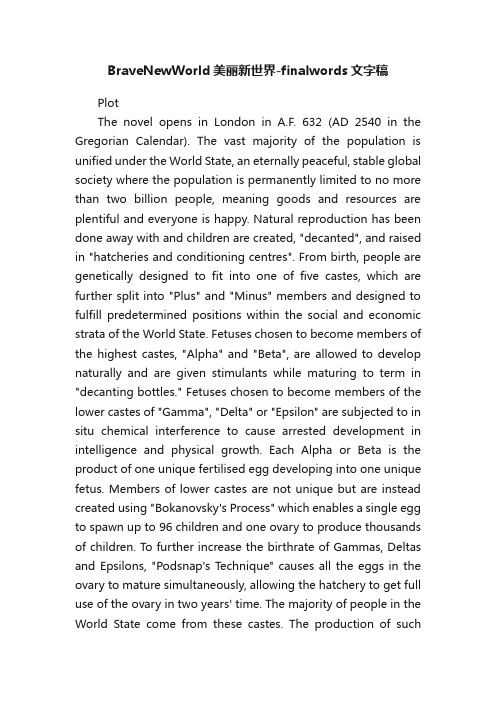
盘锦高升经济区简介2012年11月一、盘锦市概况盘锦市是1984年6月经国务院批准设立的省辖市,位于辽宁省西南部、渤海辽东湾北岸、辽河三角洲中心地带。
区域总面积4071平方公里,总人口约140万。
(一)盘锦市基本情况盘锦市位于辽宁省西南部,地处辽河三角洲中心地带。
东北邻鞍山市辖区,东南隔大辽河与营口市相望,南临渤海辽东湾,西北邻锦州市辖区。
同时位于沈阳经济区与京津塘城市群之间的联接带,居于东北亚经济圈与环渤海经济区的交叉点,是辽宁沿海经济带(国家战略)重要节点城市,是中国东北地区最具发展潜力的城市。
盘锦素有“油城”、“湿地之都”、“鱼米之乡”之称。
中国第三大油田——辽河油田坐落于此。
海岸线118公里,淡水养殖面积约2万公顷,是中国最大的河蟹养殖基地和著名的文蛤、海蜇生产基地。
全市年产优质水稻100余万吨。
拥有世界奇观红海滩,地下温泉、地下盐卤水、芦苇湿地生态旅游资源丰富、丹顶鹤、黑嘴鸥等约有250种珍惜鸟类栖息与繁衍。
现在的盘锦被誉为“七彩的盘锦”,这里有:黑石油、金水稻、绿苇荡、红海滩、青河蟹、蓝海洋、白海鸟。
(二)盘锦市经济盘锦市是富裕、和谐、文明的宜居城市,是全国第一批小康城市,是全国首批沿海开放城市,是中国优秀旅游城市,是北方地区唯一生态模范市,是中国东北地区最具发展潜力的城市。
2011年GDP达到1140亿,财政收入112亿,五项主要指标增幅在省里均排名第一。
城市可支配收入2.4万元,农村人均收入1.2万元,人均收入排名全省第二。
盘锦市2011年社会消费品零售额达到217亿元。
全市实际利用外资达到20亿美元,总量全省第三,增速全省第一。
二、高升经济区概况高升经济区位于盘锦东北,2010年9月成立,2011年10月经省政府批准成为是辽宁省唯一的省级农业综合示范区,2012年1月被农业部批准成为国家级现代农业示范区。
示范区总规划面积330平方公里,下辖高升镇、陈家镇和德胜镇,共有35个村,108个自然屯,人口10万。
美丽新世界 Awhole new world
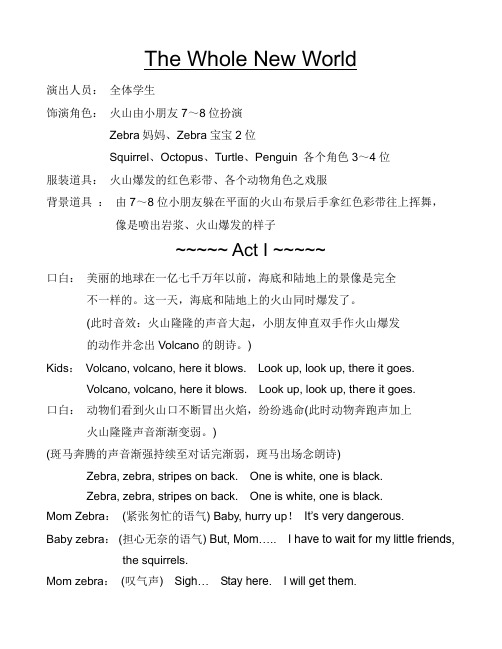
The Whole New World演出人员:全体学生饰演角色:火山由小朋友7~8位扮演Zebra妈妈、Zebra宝宝2位Squirrel、Octopus、Turtle、Penguin 各个角色3~4位服装道具:火山爆发的红色彩带、各个动物角色之戏服背景道具:由7~8位小朋友躲在平面的火山布景后手拿红色彩带往上挥舞,像是喷出岩浆、火山爆发的样子~~~~~ Act I ~~~~~口白:美丽的地球在一亿七千万年以前,海底和陆地上的景像是完全不一样的。
这一天,海底和陆地上的火山同时爆发了。
(此时音效:火山隆隆的声音大起,小朋友伸直双手作火山爆发的动作并念出Volcano的朗诗。
)Kids:Volcano, volcano, here it blows. Look up, look up, there it goes.Volcano, volcano, here it blows. Look up, look up, there it goes.口白:动物们看到火山口不断冒出火焰,纷纷逃命(此时动物奔跑声加上火山隆隆声音渐渐变弱。
)(斑马奔腾的声音渐强持续至对话完渐弱,斑马出场念朗诗)Zebra, zebra, stripes on back. One is white, one is black.Zebra, zebra, stripes on back. One is white, one is black.Mom Zebra:(紧张匆忙的语气) Baby, hurry up!It’s very dangerous.Baby zebra:(担心无奈的语气) But, Mom….. I have to wait for my little friends, the squirrels.Mom zebra:(叹气声) Sigh… Stay here. I will get them.(此时火山爆发声隆隆作响渐大声;squirrels一群跑出场念朗诗)Ss:Squirrel, squirrel, eat a nut. With his teeth, cut, cut, cut.Squirrel, squirrel, eat a nut. With his teeth, cut, cut, cut.S1:We should get more nuts.All:(互相点头) Yes, we need more and more. (班马伴随马蹄声进场) S 1:Hi! Mommy zebra.Mom zebra:Little squirrels, we have no time. My baby is waiting for you all. We’d better go.Squirrels:Okay.(角色们退场,灯光渐暗)(场景:火山爆发道具与水蓝色彩带布制成海水的景像)(火山爆发声伴着Volcano朗诗)Volcano volcano here it blows. Look up, look up, there it goes. Volcano volcano here it blows. Look up, look up, there it goes.~~~~~ Act II ~~~~~口白:海底的火山爆发了,海底的生物也遭受到空前的危机…….(火山爆发声,Octopus们进场并念朗诗。
九年级上册课件:unit1thechangingworldtopic3sectionc(教学设计
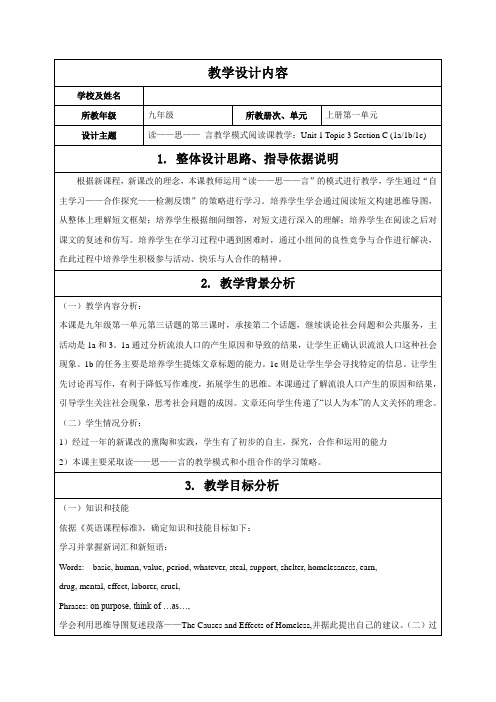
Q3:Think of the causes and effects ,please come up with an idea to help the homeless
around you.
( 2’)
An idea:_________________________________________________________________
3. 教学目标分析
(一)知识和技能 依据《英语课程标准》,确定知识和技能目标如下: 学习并掌握词汇和新短语:
Words: basic, human, value, period, whatever, steal, support, shelter, homelessness, earn, drug, mental, effect, laborer, cruel, Phrases: on purpose, think of …as…, 学会利用思维导图复述段落——The Causes and Effects of Homeless,并据此提出自己的建议。(二)过
Ⅶ. Blackboard design Unit 1 Topic 3
The world has changed for the better. Section C
Paragraph 1
Homeless
Q1: What has the government done to help the homeless people? ( 3’)
The government has found the program to help the homeless. Once they find people in need,
1 ) Number the paragraphs first and circle the key word to expresses the main idea of each paragraph.
《Our World》教案全面版.pptx

3. Useful expressions and key points.
4.Do some exercises.
Step 4 Writing
1. Show the structure of the introduction of an invention. Talk about the advantages and
2
学海无 涯
的写作技巧。 2.教学目标
○1知识与技能:掌握一些重要短语;学习和应用确定和不确定的表达
○2过程和方法:通过师生互动引导学生去发现介绍发明物的结构,从而加强对写
作的指导 ③情感态度与价值观:鼓励学生努力学习创造更多的发明来为人类服务 3.重难点 让各个不同阶层的学生都能根据框架结构来介绍发明物 4.教具 多媒体、录音机和图片 二、学情分析
Step 2 Lead in
Show a picture of Robot and talk about it.
---What can Robots do ? They can save peey can save people in danger ?
Unit 4 Topic 2 Section A(说案)
黄惠 2009、12
一、教材分析
1. 教材的地位和作用 Section A 是仁爱英语八年级上第四单元第 2 个话题中第一个课时,本话题围绕
着发明而展开,学习和掌握确定和不确定的表达,在此基础上描述发明物---机器 人。本节课是在掌握机器人的优缺点,因此我在教材的处理上是以这篇文章为载 体,引导学生掌握介绍发明物的结构为重点,从而指导学生掌握怎样介绍发明物
1) Where did Kangkang go to the ScienceCenter ?
- 1、下载文档前请自行甄别文档内容的完整性,平台不提供额外的编辑、内容补充、找答案等附加服务。
- 2、"仅部分预览"的文档,不可在线预览部分如存在完整性等问题,可反馈申请退款(可完整预览的文档不适用该条件!)。
- 3、如文档侵犯您的权益,请联系客服反馈,我们会尽快为您处理(人工客服工作时间:9:00-18:30)。
化) the use of the assembly [əˈsɛmbli] line(流水 线).
Characters John is a savagery.
John – the illicit [ɪˈlɪsɪt](
非法的) son of the Director of the Incubation [ˌɪnkjəˈbeʃən,}Center and Linda, born and reared on the Savage [ˈsævɪdʒ] adj.未开化 的; 野蛮的Reservation (“Malpais”) after Linda was unwittingly { ˌʌnˈwɪtɪŋlɪ](不知情地) left behind by her errant[ˈerənt] (犯错误的 ; 行为不当的) lover.
2. About the main idea
• TIME:AD2540(632A.F
.-After Ford) • two places:
reservation(保留地) World State(世界国)
bdoiffgeuresnhtajopbpsy
different class
I. Fetuses [ˈfitəs]n.(胎,胎儿)are chosen to become members of different castes [kæ st] (社会等级) -------(α)alpha,(β)beta, (γ)gamma, (δ)delta, (ε)epsilon.
II. ending is better than mending (扔掉好过修补) ----- The government encourages people to consume as much as possible in order to increase employment.
III. soma is daily necessities-----It is a kind of drug but make people forget worry. civilized person can't live without it.
IV.recreational [ˌrekriˈeɪʃənl] (消遣的; 娱乐的) sex is an integral [ˈɪntɪgrəl](必须的) part of society-----"everyone belongs to everyone else"&no "family"
V.People are bred [bred] v.{生育( breed的过去式和 过去分词 ); 繁殖; 孕育; 导致}to do their jobs and to enjoy them----- The fate(命运) of the people was set at the beginning
1:About the writer
• Aldous Huxley (阿道司·赫 胥黎)
• Time:1894-1963
• He was a grandson of the famous biologist Thomas Henry Huxley(1825-1895) ,who has written Evolution and Ethics (天 演论).Aldous was also a successful writer, Brave New World was his bestknown work.
The brave new world美丽新世 界PPT
① was famous for its dystopian [dɪs'tɒpiə](反乌托邦的) spirit with George Orwell(乔治奥威尔)’s “1984”and Zamyatin (扎米亚京)’s “We ”.
• Time:written in1931
published in
1932
What I Will Introduce
1:About the writer 2: About the main idea 3:About the characters 4:About two parts of this
novel 5:About my impression
Characters
• Bernard Marx – an Alpha-Plus sleep-learning specialist at the Central London Hatcheries
[ˈhæ tʃəri]n.(尤指鱼的)
孵化场 and Conditioning(调节 ) Centre.
; 操纵; 控制(心理操控), • classical conditioning(建立婴儿条件反射)
3.Characters
• Henry Ford, who has become a messianic
[ˌmesiˈænɪk] (救世主的)
figure to The World State. “Our Ford” is used in place of “Our Lord”, as a credit to popularising(vt.
Hatcheries and Conditioning Centre (生育与控治中心)
• Create reproductive [ˌriprəˈdʌktɪv]adj.(生殖的; 再生产的; 复 制的)technology(人体试管培植),
• sleep-learning(睡眠学习), • psychological manipulation [məˌnɪpjʊˈleʃən]n.(熟练的)操作
• Helmholtz [ˈhɛlmˌholts] Watson [ˈwɑtsən]– handsome and successful Alpha-Plus lecturer at the College of Emotional Engineering and a friend of Bernard.
